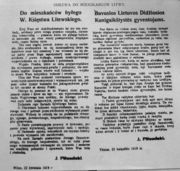
Proclamation to the inhabitants of the former Grand Duchy of Lithuania
Encyclopedia

Proclamation
A proclamation is an official declaration.-England and Wales:In English law, a proclamation is a formal announcement , made under the great seal, of some matter which the King in Council or Queen in Council desires to make known to his or her subjects: e.g., the declaration of war, or state of...
, formulated by Józef Piłsudski and distributed mainly in Vilnius
Vilnius
Vilnius is the capital of Lithuania, and its largest city, with a population of 560,190 as of 2010. It is the seat of the Vilnius city municipality and of the Vilnius district municipality. It is also the capital of Vilnius County...
(Wilno) on April 22, 1919. The proclamation was printed in the Polish
Polish language
Polish is a language of the Lechitic subgroup of West Slavic languages, used throughout Poland and by Polish minorities in other countries...
and Lithuanian language
Lithuanian language
Lithuanian is the official state language of Lithuania and is recognized as one of the official languages of the European Union. There are about 2.96 million native Lithuanian speakers in Lithuania and about 170,000 abroad. Lithuanian is a Baltic language, closely related to Latvian, although they...
s after Polish forces captured Vilnius in the Vilna offensive
Vilna offensive
The Vilna offensive was a campaign of the Polish–Soviet War of 1919–1921. The Polish army launched an offensive on April 16, 1919, to take Vilnius from the Red Army. After three days of street fighting from April 19–21, the city was captured by Polish forces, causing the Red Army to...
during the Polish–Soviet War. It was a statement of Piłsudski's political intentions, and contained a blueprint for his Międzymorze
Miedzymorze
Międzymorze was a plan, pursued after World War I by Polish leader Józef Piłsudski, for a federation, under Poland's aegis, of Central and Eastern European countries...
federation. The declaration was sharply criticized by both Polish and Lithuanian nationalists.
In issuing the proclamation bilingually, Piłsudski was appealing to the Lithuanians, hoping to recreate the Polish–Lithuanian Commonwealth. The style of the proclamation, the ideas contained within it, and the dramatic turn of phrase were definitely Piłsudski's, and reflected his position on the political and military situation he wished to resolve. Piłsudski pledged to ordain "elections which would take place on the basis of secret, universal and direct voting, without distinction between the sexes" and to "create an opportunity for settling your nationality problems and religious affairs in a manner that you yourself will determine, without any kind of force or pressure from Poland
Poland
Poland , officially the Republic of Poland , is a country in Central Europe bordered by Germany to the west; the Czech Republic and Slovakia to the south; Ukraine, Belarus and Lithuania to the east; and the Baltic Sea and Kaliningrad Oblast, a Russian exclave, to the north...
."
Piłdudski's proclamation was aimed at showing good will both to Lithuanians
Lithuanians
Lithuanians are the Baltic ethnic group native to Lithuania, where they number around 2,765,600 people. Another million or more make up the Lithuanian diaspora, largely found in countries such as the United States, Brazil, Canada, Colombia, Russia, United Kingdom and Ireland. Their native language...
and international diplomats. It succeeded with the latter, as the proclamation dealt a blow to the image of 'Polish conquest' and replaced it with the image of 'Poland fighting with Bolshevik
Bolshevik
The Bolsheviks, originally also Bolshevists , derived from bol'shinstvo, "majority") were a faction of the Marxist Russian Social Democratic Labour Party which split apart from the Menshevik faction at the Second Party Congress in 1903....
dictatorship and liberating other nations'. However, the Lithuanians who demanded exclusive control over the city saw the proclamation as a facade for Polish imperialism. Piłsudski's words also caused much controversy on the Polish political scene as they were not debated in the Sejm
Sejm
The Sejm is the lower house of the Polish parliament. The Sejm is made up of 460 deputies, or Poseł in Polish . It is elected by universal ballot and is presided over by a speaker called the Marshal of the Sejm ....
. This caused much anger among Piłsudski's opponents from the National Democracy faction. Deputies from Polish People's Party demanded incorporation of the Vilnius Region
Vilnius region
Vilnius Region , refers to the territory in the present day Lithuania, that was originally inhabited by ethnic Baltic tribes and was a part of Lithuania proper, but came under East Slavic and Polish cultural influences over time,...
into Poland, and even accused Piłsudski of treason. However Piłsudski's supporters in the Polish Socialist Party
Polish Socialist Party
The Polish Socialist Party was one of the most important Polish left-wing political parties from its inception in 1892 until 1948...
managed to deflect those attacks.
See also
- 1919 Polish coup d'état attempt in Lithuania1919 Polish coup d'état attempt in LithuaniaThe Polish coup d'état attempt in Lithuania refers to a failed attempt by Józef Piłsudski to overthrow the existing government of Lithuania, led by Prime Minister Mykolas Sleževičius, and install a more pro-Polish cabinet that would agree to a union with Poland. The coup d'etat was to be carried...
- Republic of Central LithuaniaRepublic of Central LithuaniaThe Republic of Central Lithuania or Middle Lithuania , or simply Central Lithuania , was a short-lived political entity, which did not gain international recognition...

